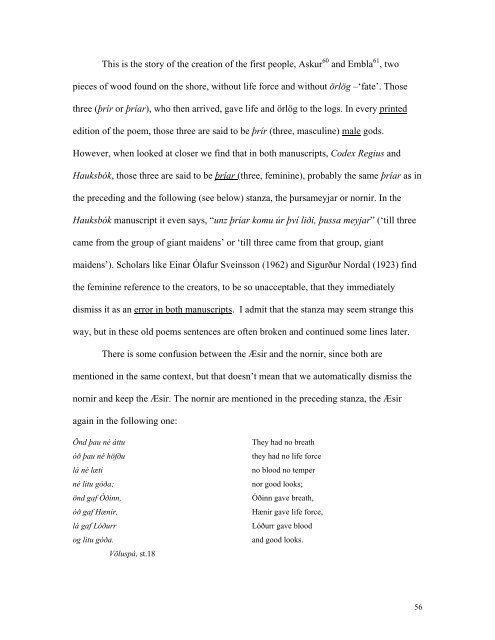You also want an ePaper? Increase the reach of your titles
YUMPU automatically turns print PDFs into web optimized ePapers that Google loves.
This is the story <strong>of</strong> the creation <strong>of</strong> the first people, Askur 60 <strong>and</strong> Embla 61 , two<br />
pieces <strong>of</strong> wood found on the shore, without life force <strong>and</strong> without örlög –‘fate’. Those<br />
three (þrír or þríar), who then arrived, gave life <strong>and</strong> örlög to the logs. In every printed<br />
edition <strong>of</strong> the poem, those three are said to be þrír (three, masculine) male gods.<br />
However, when looked at closer we find that in both manuscripts, Codex Regius <strong>and</strong><br />
Hauksbók, those three are said to be þríar (three, feminine), probably the same þríar as in<br />
the preceding <strong>and</strong> the following (see below) stanza, the þursameyjar or nornir. In the<br />
Hauksbók manuscript it even says, “unz þríar komu úr því liði, þussa meyjar” (‘till three<br />
came from the group <strong>of</strong> giant maidens’ or ‘till three came from that group, giant<br />
maidens’). Scholars like Einar Ólafur Sveinsson (1962) <strong>and</strong> Sigurður Nordal (1923) find<br />
the feminine reference to the creators, to be so unacceptable, that they immediately<br />
dismiss it as an error in both manuscripts. I admit that the stanza may seem strange this<br />
way, but in these old poems sentences are <strong>of</strong>ten broken <strong>and</strong> continued some lines later.<br />
<strong>The</strong>re is some confusion between the Æsir <strong>and</strong> the nornir, since both are<br />
mentioned in the same context, but that doesn’t mean that we automatically dismiss the<br />
nornir <strong>and</strong> keep the Æsir. <strong>The</strong> nornir are mentioned in the preceding stanza, the Æsir<br />
again in the following one:<br />
Önd þau né áttu<br />
óð þau né höfðu<br />
lá né læti<br />
né litu góða;<br />
önd gaf Óðinn,<br />
óð gaf Hænir,<br />
lá gaf Lóðurr<br />
og litu góða.<br />
Völuspá, st.18<br />
<strong>The</strong>y had no breath<br />
they had no life force<br />
no blood no temper<br />
nor good looks;<br />
Óðinn gave breath,<br />
Hænir gave life force,<br />
Lóðurr gave blood<br />
<strong>and</strong> good looks.<br />
56


